#critique on society
Explore tagged Tumblr posts
Text
duality is humanity.
humans are multi faceted creatures and no matter how hard society will try, we will never fit into one dimensional labels and boxes. the world is a spectrum of grey and no one is completely good or evil. so, it’s time to stop treating complex conflicts in the world and the people involved in them with that mindset, for nothing will ever be that simple.
humanity is duality.
1 note
·
View note
Text
Everytime I see “there’s no ethical consumption under capitalism” as a response to criticisms of people buying Hogwarts Legacy I take a moment to mourn the loss of nuance.
Like yes the above statement is true, but some types of consumption are more ethical than others and context matters. Buying a game based in an antisemitic premise that will line the pockets of a transphobe who has been cited as a source in and actively promotes anti-trans legislature is not the same thing as buying fast fashion because you can’t afford anything better or that’s the only place that sells your size. People need to stop pretending all participation in capitalism is equal.
You can buy Hogwarts Legacy, that much is your right. However, I am also within my right to criticize you and your lack of care for the communities harmed by this game and the author of its universe.
#waiting for the ‘you critique society yet you participate in it’ clown comments#anti jk rowling#not marvel
18K notes
·
View notes
Note
You're not uniquely talented or hard working you just went to the right schools.
Yes, yes! This is exactly why I started Philosophy Tube! Why shouldn't someone else, anyone else, have access to the education I got??? The intellectual and cultural heritage of our species is for everyone, not just privileged people like me! :)
#something else I'm learning from friends with ADHD is that I'm privileged to have the kind of brain that works in a way our society rewards#AND the institutions that I was able to attend and use to grow were often themselves the product of a society that not only excluded#but actively exploited other people!#And still do!#So not only should we widen access#We should give people the power to critique those institutions too#Education should give you power over your own life
2K notes
·
View notes
Text
"Those who choose the lesser evil forget very quickly that they chose evil"
Hanna Arendt, "Personal Responsibility Under Dictatorship"
#Ooooooooh this is such a golden quote#But also just clarifies how liberals wash their hands of making any actual improvement in the country beyond Voting Blue#And then claiming they've fulfilled their duty to improving society#To which I say - you’re clowns and you will have blood on your hands for as long as you refuse to engage for real change.#BEYOND ELECTORAL POLITICS.#Vote Blue No Matter Who#Joe Biden#US elections#2024 election#US politics hate#Can’t believe this came from a Call of Duty video about torture. But yet at the same time I can. Because it's an actual academic critique#Also to all liberals and neoliberals reading this: either change or die
329 notes
·
View notes
Text
Um if you write Jason having to get drugs for Catherine I want you dead btw. Not only does it tell me you assume the average drug dealer would give the hard shit to a very small child and then not supervise them at all (classist stereotype that all drug dealers are inherently evil + lazy writing with no grasp on reality) and you genuinely think that Catherine was CONSTANTLY high, as if that's even possible without overdosing far sooner than she did. That's without even getting into the bad mom Catherine propaganda.
#dc#jason todd#Catherine Todd#I don't like talking about personal shit on the Internet#but I'm someone who grew up in a family of addicts and dealers and the attitude so many of these fics have#is so fucked up#like yeah my uncle would give a 15 year old weed but he won't even let them be in the house while he's doing coke#every dealer I've ever met had been THRILLED about my enthusiasm towards school and they always encouraged me#Multiple of them have given me actual job opportunities because they know a lot of people and they help their own#you guys actually just hate poor people and demonize addiction!#it's actually starting to piss me off#you don't have to write Cathy as a perfect example of morality#but if you turn her into a neglectful monster I assume you're either classist or projecting#it actually is possible to write Jason parentifying himself in order to take care of Cathy#without blaming a terminally ill woman who was already dying and likely in immense pain#you guys could be critiquing capitalism and our healthcare system and how it fails the most vulnerable people in our society#but instead you're playing up how gross and evil addicts and dealers and petty crooks are to make Jason's lige sadder???#his life already sucks you don't have to be classist to make it worse I promise
110 notes
·
View notes
Text
"queernorm" worlds are fine and i do understand why people like them + why there's a desire to make their depictions of queer experiences legible to an audience who lives under real-world gender and sexuality norms. but for me i always end up feeling a little dissatisfied by them because they still end up implicitly adhering to certain real-world norms that in-universe have no real reason to exist. can we not imagine a world in which gender/sex assignments entirely don't exist? what could gender and gendered expression even mean in that world? how would romance and kinship and care be reimagined there? how far could you potentially go in totally deconstructing those norms? wouldn't it be nice to imagine a world so different from our own that even the language we have to describe certain experiences is no longer the same? im dissatisfied by the inability to go much further, even if i do understand why people don't
#narrates#once you reject societal norms you realize theyre the ground you were standing on etc etc#crack the worlds shell and all that#i understand why someone wouldn't want to reinvent the baseline of an entire society. i truly do. this isnt a critique of any author#just merely a question of: do you know these processes are violent irl?#could we try to imagine a world totally without that violence?
70 notes
·
View notes
Text
I'm really not a villain enjoyer. I love anti-heroes and anti-villains. But I can't see fictional evil separate from real evil. As in not that enjoying dark fiction means you condone it, but that all fiction holds up some kind of mirror to the world as it is. Killing innocent people doesn't make you an iconic lesbian girlboss it just makes you part of the mundane and stultifying black rot of the universe.
"But characters struggling with honour and goodness and the egoism of being good are so boring." Cool well some of us actually struggle with that stuff on the daily because being a good person is complicated and harder than being an edgelord.
Sure you can use fiction to explore the darkness of human nature and learn empathy, but the world doesn't actually suffer from a deficit of empathy for powerful and privileged people who do heinous stuff. You could literally kill a thousand babies in broad daylight and they'll find a way to blame your childhood trauma for it as long as you're white, cisgender, abled and attractive, and you'll be their poor little meow meow by the end of the week. Don't act like you're advocating for Quasimodo when you're just making Elon Musk hot, smart and gay.
#this is one of the reasons why#although i would kill antis in real life if i could#i also don't trust anyone who identifies as 'pro-ship'#it's just an excuse to shut down legitimate ethical questions and engaging in honest self-reflective media consumption and critique#art doesn't exist in a vacuum#it's a flat impossibility for it not to inform nor be informed by real world politics and attitudes#because that's what it means to be created by human hands#we can't even make machine learning thats not just human bias fed into an algorithm#if the way we interact with art truly didn't influence anything then there would be no value in it#just because antis have weaponized those points in the most bad faith ways possible#doesn't mean you can ignore them in good faith#anyway fandom stans villains because society loves to defend and protect abusers#it's not because you get the chance to be free and empathetic and indulge in your darkness and what not#it's just people's normal levels of attachment to shitty people with an added layer of justification for it#this blog is for boring do-gooder enjoyers only#lol#knee of huss#fandom wank#media critique#pop culture#fandom discourse
205 notes
·
View notes
Text
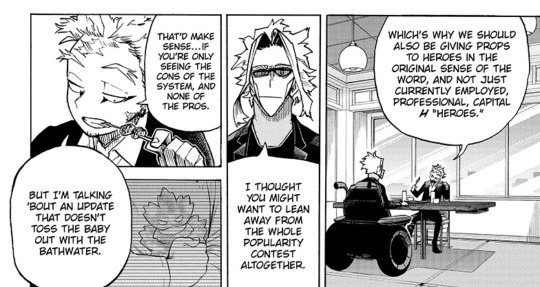
it sounds like hawks is probably going to keep the ranking system, and when he says he's keeping it bc the people who want to tear it down are "only seeing the cons of the system, and none of the pros," it shows keigo's childhood plushie of endeavor, and that's wild to me. "the popularity contest still has its pros," hawks says as he thinks of his idol endeavor, the man who abused and neglected his whole family because he wanted to win said popularity contest.
and it's specifically a panel of keigo's plushie, which reads to me that keigo's holding onto his childhood worship of the man so much, he's ironically only seeing the pros of the system (whatever those are), and none of the cons. it feels like hawks has blinders on when it comes to endeavor, and it's felt that way ever since he found out about endeavor's past and immediately, seemingly without any inner conflict, gave his stamp of approval anyways bc hey, at least endeavor's trying now! and i'm disappointed considering how complex a character he seemed when he was introduced. sigh.
#are the 'pros' that he had hope bc he found out abt endeavor through the media?#bc u can still have the publicity without the popularity contest...........#keigo my beloved what did they do to you#rei rambles#bnha#bnha spoilers#spoilers#anti endeavor#anti hawks#kinda. it's not really anti hawks so much as it is anti hawks's character arc but. well. it's not very nice so. 😅😅😅#hawks came off as smart and critical of hero society esp bc the commission raised and trained him at a young age#but he really didnt turn any of those smarts and critiques on his idol at all and it's been a really bad sticking point for me personally#big big sigh#i genuinely dont understand the quick panel flashback to the endeavor plushie#does someone else have a different reading for that panel cuz im having trouble being unbiased#i cant be unbiased about the way this manga is ending i am Struggling it's so hard
75 notes
·
View notes
Text
i still cannot believe that people consider having lovers outside of a political marriage as cheating
a lot can be discussed about how raging misogyny and the patriarchy in westeros has led to unequal standards for women to uphold and suffer from
as highborn women are not allowed the same sexual freedom that highborn men get to experience, and even if these women do have relationships outside of their marriages, they are usually scorned and shunned by society for daring to practice sexual autonomy
it’s unfair, i am very aware of this fact
(that’s why i’ll never understand team green stans)
but george has never ever condemned his characters for finding and experiencing love outside of doing their duty.
never.
we’re not unfeeling machines that lack emotions. we’re humans who are, more often than not, led by our hearts. and grrm does a phenomenal job when creating characters, as they truly feel human.
so yeah, it’s a bit disappointing that people dumb down what is clearly a very complex situation to “cheating” (btw george himself calls rhaegar and elias relationship complex and he’s never implied that they loved each other in a romantic sense).
to reiterate, i am well aware that highborn women and men are held to different standards, however, if you have a problem with characters working through, around, and sometimes failing to overcome the social structures that cause their suffering, then you must have a major issue with george’s exploration of the human heart in conflict with itself.
george’s characters aren’t robots and that’s what makes them interesting. they do things for very human reasons. they’re biased. they’re traumatized. they’re conflicted. but they’re still reaching for a better tomorrow and they’re still trying to find happiness.
so i’ll never consider rhaegar and lyannas relationship as cheating, or something unsightly that should be scorned. for they simply dared to find and grasp love in a society that would rather shackle them to unhappy marriages, which is very commendable.
oh… and do you know what george does criticize?
political marriages lol
he makes it clear that selling women off as broodmares and forcing men into marriages they don’t want is a recipe for disaster.
of course the eventual fallouts of these relationships is super interesting to read about, but you should never ever support the systems in place and the societies that benefit from pushing people/characters into these incredibly unhealthy relationships
so while i find it interesting to read about characters navigating these relationships, i’ll always be the first person to condemn these societies for forcing this fate onto them. i’ll also always be the first person to root for characters who do their best to find happiness outside of their political/arranged marriage
sorry that i don’t condemn a character for finding love outside of a loveless marriage
instead of getting angry at rhaegar and lyanna and being very nonsensical in the main tags about it, how about you turn that anger onto the patriarchy, which is rooted in every single institution and family in westeros, the patriarchy that refuses to allow women to have the same amount of sexual autonomy as men?
(this is why i despise team green :))
#instead of criticizing the characters who are just trying to live and find happiness in a very violent/misogynistic society#perhaps you should critique the systems that created these situations :)#expecting characters to just be miserable and suffer through their marriages just because they (were forced) said some vows is stupid#i hate how people try to idealize suffering/doing your duty even if it makes you miserable (or whatever the fuck those weirdos go on about)#and then demonize characters who tried to take back their autonomy#guys going against systems/institutions that have been around for thousands of years and feed off of violence and suffering#is not easy and may or may not result in bloodshed. but going against these systems is still praiseworthy#what we should condemn are the characters who try to uphold these systems and use said systems to demonize characters who go against them#like when ppl try to say that rhaegar and lyanna began the war#they ignore the actions of literally every single other character that also helped cause the rebellion#i despise barristans whole “rhaegar loved his lady lyanna and thousands died for it” speech#asoiaf fandom critical#anti elia stans#anti alicent stans#anti team green#rhaegar targaryen#lyanna stark#asoiaf#sorry for any spelling mistakes lol#if rhaegar haters have no haters then i am dead
89 notes
·
View notes
Text
The way some people talk about Neil and Todd's relationship make me think we didn't watch the same movie.
Todd didn't ruin Neil nor did Neil become unhappy by being friends with Todd. Todd wasn't a burden to Neil. The reason Neil was so unhappy was because of his father and the expectations of others on him.
Neil doesn't see Todd as "an experience" and I think that claim really undermines Neil as a character. I understand why some people believe that but Neil is a very genuine character and doesn't create bonds with any of the poets "for the hell of it". Neils the type of person to show up at your front door if he hasn't talked to you in 3 days. Watching their scenes together, watching the relationship these characters develop, even the way Todd reacts to Neils death. It shows there's a lot more than what the camera showed us, especially when Todd screams at Cameron about Neil loving acting. Although obviously everyone knows that Neil loves acting, that part alone just showed there's a whole lot more conversation that we missed betweens these characters and whole lot more than an "experience"
TLDR: People mischaracterize the hell out of Neil
#dead poets society#dead poets fandom#dps fandom#dead poets#neil perry#todd anderson#anderperry#analysis post#character analysis#media analysis#media critique
176 notes
·
View notes
Text
not to do discourse or anything. but one of the things that is very funny to me about the whole "soft fantasy escapism world with no homophobia" trend is that they all wind up looking the same, while books that genuinely seriously engage with the ways in which queer people respond to repression are more likely to go in wildly divergent specific directions. The response to stories that uncritically replicated modern models of homophobia in settings where they made no sense was to uncritically replicate models of queer 'normalcy' in settings where they make no sense. whereas actually engaging with the nuances of living in those systems gives you access to the wide variety of specific experience that exists in real life. something here also about how writers in the imperial core attempt to imagine a world without the colonial spread of homophobia as a tool of empire but don't actually know anything about the diversity of sexual and gender structures that exists in pre-, post-, and noncolonial communities. and so have a thing that their settings Aren't, but not a thing that they Are
#one day i'll finish traitor baru cormorant#but it is not this day.#idk how salient a critique this is i'm not up to date with the Modern Fantasy Zeitgeist so i'll own some ignorance#but it is always funny to me when an author is trying to show how Queer a society is by being like#in this world... a woman is married to Two Men#And No One Thinks That's Weird#and then we stop there#how does your polyamorous society handle property inheritance#what other structures do they have#like in real life there are so many answers to that question and they're all super complicated#blah blah blah#disk horse
67 notes
·
View notes
Text
me reaching for my phone and opening tumblr.com/dashboard as soon as I wake up: wow, I can't believe lindy opens her bubble as soon as she wakes up. talk about chronically online
#doctor who#doctor who spoilers#people are saying dot and bubble isn't a criticism of tiktok and social media#and to them i would say#no sorry it actually is#it's just that what it's criticizing isn't so much ''lol tiktok is ruining society because dances and tide pods''#and more ''social media has become increasingly insular to the point where we forget to see outside of our own perspectives''#and also ''surounding yourself only with people who are like you and agree to perpetuate your status quo…#…even in spaces where difference is encouraged and celebrated is detrimental to you those around you and society in general actually''#which is also critiques one can make about white supremacism#and ignoring the criticisms the episode makes about social media#imo ignores a big part of the message rtd was trying to convey in this episode
57 notes
·
View notes
Photo
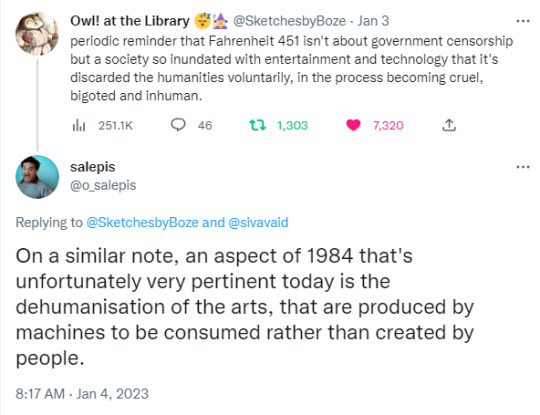
#tweet#tweets#twitter#books and literature#books and writing#books and libraries#books and authors#books and reading#1984#nineteen eighty four#fahrenheit 451#dystopian#Dystopia#AI art#AI#Society and Culture#pop culture#cultural critique#cultural criticism#technology#Entertainment#movies#film#TV#art#the arts#novel writing machine#george orwell#orwellian#orwell
1K notes
·
View notes
Text
I love the line, "They sell presentable, young and so ingestible, sterile and collectible, safe, and I can't stand it," SO much. It really gets at the heart of what so much of Danger Days is trying to say imo. And I especially love the sort of visceral note in the phrase "young and so ingestible" - like obviously the image of art and artist as something to be consumed has been around for ages and it doesn't have to evoke anything so literal as the audience wanting to physically eat the band, but it certainly calls that to mind for me, and the idea that the music industry (and capitalism more broadly) exists to facilitate and encourage that desire is just... chef's kiss.
#danger days is a work of legitimately interesting anti-capitalist critique and i love that for her#the question of how to be an artist in a late capitalist society that wants to sell your voice and package your rebellion as a commodity#that ultimately serves and upholds the status quo is a really interesting one that gets explored in this verse and also sing#it's just a good fuckin album is i guess what i'm saying#mcr#my chemical romance#danger days#danger days the true lives of the fabulous killjoys#ddttlotfk#ttlotfk#danger days era#planetary (go!)
38 notes
·
View notes
Text
SPOT THE DIFFERENCE CHALLENGE!
LEVEL: IMPOSSIBLE

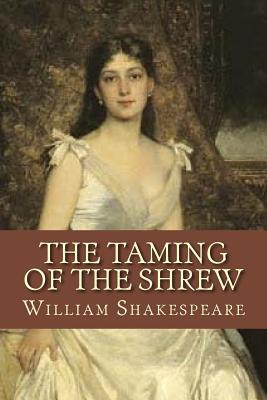
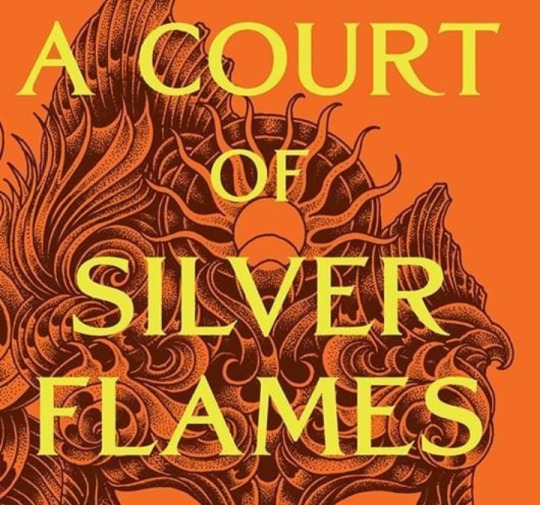
#sjm critical#anti nessian#acotar critical#sapphic nesta agenda#at least the first two are meant to critique and challenge society acosf... is a romance book... 💀
23 notes
·
View notes
Text
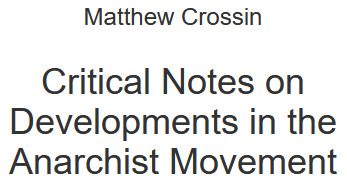
Anarchists and Neo-anarchists: Horizontalism and Autonomous Spaces
It is not uncommon, particularly in North America, to see anarchism defined as an ideology rooted in ‘direct democracy’, consensus decision making, and the maintenance of ‘horizontal’ (i.e., ‘non-hierarchical’) social relations, particularly in autonomous zones or public spaces.
This idea of anarchism is unusual in that it places at the centre of its definition an adherence to very specific forms of procedure and interpersonal behaviour while downplaying the political ends a ‘horizontal’ movement should be trying to establish. From this perspective, reclaiming public space as an opportunity to hold non-hierarchical public assemblies, where we can hammer out decisions by consensus, is, in itself, ‘anarchist’ – whatever the result of such processes.
This has little to do with the classical, mass-anarchist tradition and its politics of revolutionary socialism. It is, instead, an approach which is better described as falling under the banner of ‘neo-anarchism’ (or ‘small-a anarchism’). Neo-anarchism is a modern conception of anarchism largely informed by the feminist and peace movements of the 70s, the environmental movement of the 80s, the alter-globalisation movement of the 90s, and the Argentinian uprising of 2001; which coined the term horizontalidad (‘horizontalism’) to describe the movement’s rejection of representative democracy, the use of general assemblies to coordinate activity, and converting abandoned or bankrupt factories into cooperative businesses.
Take, for instance, the insistence by neo-anarchists on the use of consensus decision making. Though consensus (or ‘unanimity’, as it was typically called) was sometimes a feature of anarchist political organisations, and often seen as an ideal to work towards through comradely discussion, it was never a fundamental component of the anarchist movement. Anarchists have generally agreed that the appropriate form of decision making depends on the circumstances concerned, and frequently endorsed variations of majoritarian voting; particularly in mass organisations based on commonalities other than close-ideological affinity, such as unions. The focus for anarchists has generally not been the form of decision-making, but instead the principles of free association and solidarity. Furthermore, though anarchists have always stressed the right ofthe minority to be free of the majority’s coercion, it is even more important that the great majority be free of minoritarian rule or sabotage. As Malatesta wrote in his pamphlet Between Peasants: A Dialogue on Anarchy:
everything is done to reach unanimity, and when this is impossible, one would vote and do what the majority wanted, or else put the decision in the hands of a third party who would act as arbitrator, respecting the inviolability of the principles of equality and justice which the society is based on.
In response to the concern over minoritarian sabotage, he continues by asserting that such a situation would
[make it] necessary to take forcible action, because if it is unjust that the majority oppress the minority, it’s no more just that the contrary should happen. And just as the minority have the right of insurrection, so do the majority have the right of defense, or if the word doesn’t offend you, repression.[3]
As for ‘autonomous zones’ and the tactic of reclaiming public spaces (as seen in the Occupy movement) – here we have no connection to anarchism as a revolutionary tradition, and an example of a tactic which has repeatedly shown its inability to extract significant reforms, let alone revolutionise production and destroy the State.
The fundamental limitations of the ‘public occupation’ or ‘autonomous zone’ , and the defeats which have followed from these limitations, have led some former advocates of the strategy to make a notable transition from neo-anarchism to parliamentary politics. Though inexplicable to some outside observers, the change is easily understood when we consider neo-anarchism’s peculiar view of ‘direct democracy’, or ‘horizontally organised spaces’, as the defining characteristic of anarchism, and not a theory of libertarian revolution against the State and capital.
If we accept the idea of anarchism as proposed by the neo-anarchists, there is no fundamental contradiction between anarchism and involvement in parliamentary politics. If the political party is a directly democratic one, composed of social movements, and committed to horizontal interpersonal relations, what difference does it make if the decision made (ideally by consensus) is to campaign for political candidates, or even administer the State?
We have seen this with the so-called ‘Movements of the Squares’ in Europe. Activists who took part in the 15M (or ‘Indignados’) movement in Spain abandoned their dismissal of all politicians (“¡Que no nos representan!” – “They don’t represent us!”) with the formation of Podemos and various other ‘municipalist’ parties.[4]
A similar trajectory was followed by the anthropologist David Graeber towards the end of his life. Graeber – a figurehead of Occupy Wall Street and, prior to that, a participant in the alter-globalisation movement – apparently saw no contradiction between his professed (neo-)anarchism and his efforts to join the British Labour Party in support of Jeremy Corbyn. In particular, Graeber was enthusiastic about the Labour-affiliated organisation Momentum; an outgrowth of the Corbyn leadership campaign, which he argued constituted a unique attempt to fuse a radical social movement with a traditional parliamentary party.[5]
More recently we have witnessed the absurdity of a self-proclaimed ‘libertarian socialist’, Gabriel Boric (who touts his association with Chile’s radical student movement), ascending to the presidency in the aftermath of a militant popular uprising.
The damage caused by these supposedly ‘unique’ attempts to translate the ‘horizontalism’ of neo-anarchism into the party-form – which, in reality, hardly differs from the historic approach offered by Marxists as an alternative to anarchism – has been outlined well elsewhere, and there is no need to go over the details here.[6] It suffices to say that in each case there was bureaucratisation, accomodation with the necessities of administering the capitalist state (or even just campaigning to administer it), and zero empowerment of workers against the bosses.
The reality is that there is no way to fully ‘prefigure’ anarchy and communism through ‘directly democratic’ spaces of ‘autonomy’. Anarchism requires a specific anarchist movement and anarchist practice. Though we must certainly organise ourselves from the bottom up, with a consistent federalist structure, we can not simply bring about our ideal by ‘living anarchisticly’ or relating to one another as ‘horizontally’ as possible. Similarly, the content of anarchism can not be limited to the structure of our movement – its content of revolutionary class struggle must be maintained. To quote Luigi Fabbri:
If anarchism were simply an individual ethic, to be cultivated within oneself, and at the same time adapted in material life to acts and movements in contradiction with it, we could call ourselves anarchists and belong to the most diverse parties; and so many could be called anarchists who, although they are spiritually and intellectually emancipated, are and remain, on practical grounds, our enemies.But anarchism is something else… proletarian and revolutionary, an active participation in the movement for human emancipation, with principles and goals that are egalitarian and libertarian at the same time. The most important part of its program does not consist solely in the dream, which we want to come true, of a society without bosses and without governments, but above all in the libertarian conception of revolution, of revolution against the state and not through the state… [7]
#anarchist movement#autonomous zones#class struggle#criticism and critique#dual power#Elections#horizontality#insurrection#Notes#organization#Red and Black Notes#riots#social change#autonomy#anarchism#revolution#climate crisis#ecology#climate change#resistance#community building#practical anarchy#practical anarchism#anarchist society#practical#daily posts#communism#anti capitalist#anti capitalism#late stage capitalism
30 notes
·
View notes